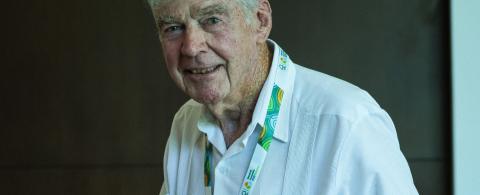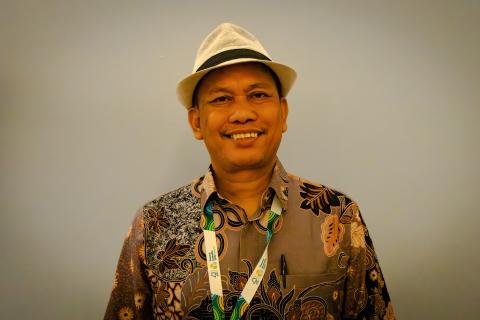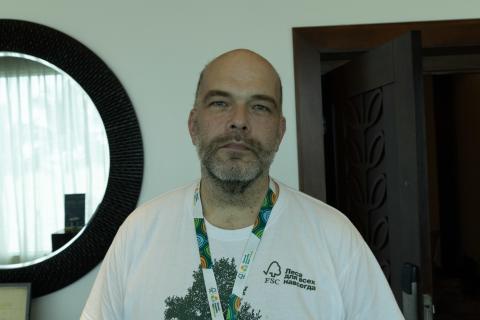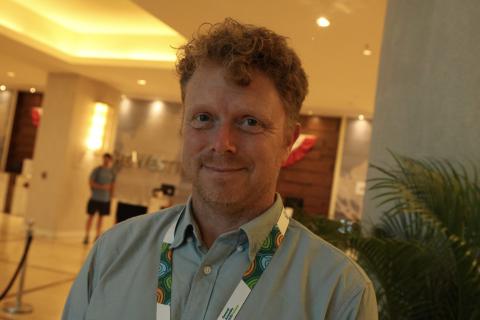Timothy Synnott: "The controversies have calmed down"
He was a constructive voice in the sustainable forestry debate, while the concept of FSC was still bubbling in its primordial soup. Twenty years later, he remains strongly engaged in sustainable forest management, and a firm supporter of FSC. Meet Tim Synnott, the first FSC Executive Director.
FSC General Assembly 2011
 Interview with Tim Synnott, one of the world's most experienced experts on responsible forest management. After thirty years of work in forestry, he became the very first Executive Director of FSC. Today, he remains supportive of FSC.
Interview with Tim Synnott, one of the world's most experienced experts on responsible forest management. After thirty years of work in forestry, he became the very first Executive Director of FSC. Today, he remains supportive of FSC.
How did you get into FSC?
.jpg) “I became involved sort of by accident. I was working at the old Oxford Forestry Institute , when some people from Friends of the Earth UK came to see me, to discuss some proposals linking timber trade with forest conservation.
“I became involved sort of by accident. I was working at the old Oxford Forestry Institute , when some people from Friends of the Earth UK came to see me, to discuss some proposals linking timber trade with forest conservation.
They launched several initiatives around that time and you may say that the concept of certification emerged from there. I saw the importance of the idea, and stayed involved in the further development".
"Hubert Kwisthout, a Dutch timber trader then of the Ecological Trading Company, picked up on the idea and turned it into an operational plan. As attempts to persuade ITTO to take the lead on developing a labeling scheme had failed, the plan was presented to an organisation called WARP (Woodworkers' Alliance for Rainforest Protection) , which played a brief but crucial role in the initial development of the system. Hubert was also responsible for the first drafts of what eventually turned into the P&C”.
You became the first Director of FSC in 1994. What was the FSC system like in the early days?
“The whole idea was a battleground! The position as Director was difficult, but I thought it was the most important job in the forestry world. There were wide differences of opinion about what the system should do".
"For example, some people vigorously attacked the idea of certifying logging in virgin forest, while plenty of people live within such forests and want to use them. Many industries did not like the idea of certification, saying that it was not feasible and that there was no market. And some went ahead and set up rival systems. My prediction then was that those systems would either disappear or would try to earn some credibility. I think time has proven me right on that point”.
How have you experienced the development of the system?
“The controversies have calmed down considerably. Those advocating extreme positions - such as “no use of chemicals”, “no certification of plantations” – are no longer leading the debate. The 1999 General Assembly marked this transition".
"The 1996 assembly was dominated by battles on the floor and came close to being a bit of a disaster. But three years later, the NGOs had clearly realised that it would be easy to destroy FSC and had come to a decision that that was not what they wanted to do.
The mood had changed dramatically between these two GAs. Witnessing the change that had taken place over just three years was a monumental experience".
.jpg) “Today, there are still strong arguments, but they tend to focus more on details. The NGOs have remained constructive. They are ready to negotiate, discuss the options, and reach consensus. It doesn’t mean that they leave their agendas. But they are willing to live with the solutions agreed on, and continue the discussions the next time”.
“Today, there are still strong arguments, but they tend to focus more on details. The NGOs have remained constructive. They are ready to negotiate, discuss the options, and reach consensus. It doesn’t mean that they leave their agendas. But they are willing to live with the solutions agreed on, and continue the discussions the next time”.
You are involved in the revision of the global FSC Principles & Criteria. What are the key proposed changes?
“There is very little that is completely new. Most of the changes are clarification, or they are proposed in order to bring the P&C up to date in relation to recent General Assembly decisions or current practices. One new item, of which I am personally proud, is the criterion 2.2 for Gender Equality. As far as I know, there have been no objections. Is that because everyone really likes the idea, or because no-one wants to be seen as objecting to it?”
“The carbon issue is important, but horribly complicated. There is a lot of room for fraud and misleading statements. It would be good if some indicators could be developed for direct inclusion into the Principles & Criteria, but they must be backed up by science”.
Your recommendation for the further development of FSC?
“Sometimes I think that FSC should be run more like a corporate business, with long term professional staff working for a Board of Directors of people experienced in working on Boards"
.
"However, this runs the risk of losing some of FSC’s most important values in that process. FSC is unique in offering a platform where environmental people talk to trade unions, and indigenous people talk to big corporations. We must not lose the essence of being a live, dynamic, engaging organisation”.
Tim Synnott: Life history snapshots
Tim Synnott grew up in the UK, enjoying his countryside life so much that he decided to become a forester. He studied forestry at Oxford, learned the profession in practice in Uganda from 1965, and has worked comprehensively in the tropics since then.
Following more than thirty years of work in forestry, Tim Synnott became the first FSC Executive Director between 1994 and 2002, based in Oaxaca, Mexico.
Today, he continues to work in support of FSC, for example as a member of the FSC P&C working group. He still lives in Mexico, where he has a small NGO and has developed an Environmental Risk Assessment system to facilitate certification of tropical community forests. This concept can be explored here.



